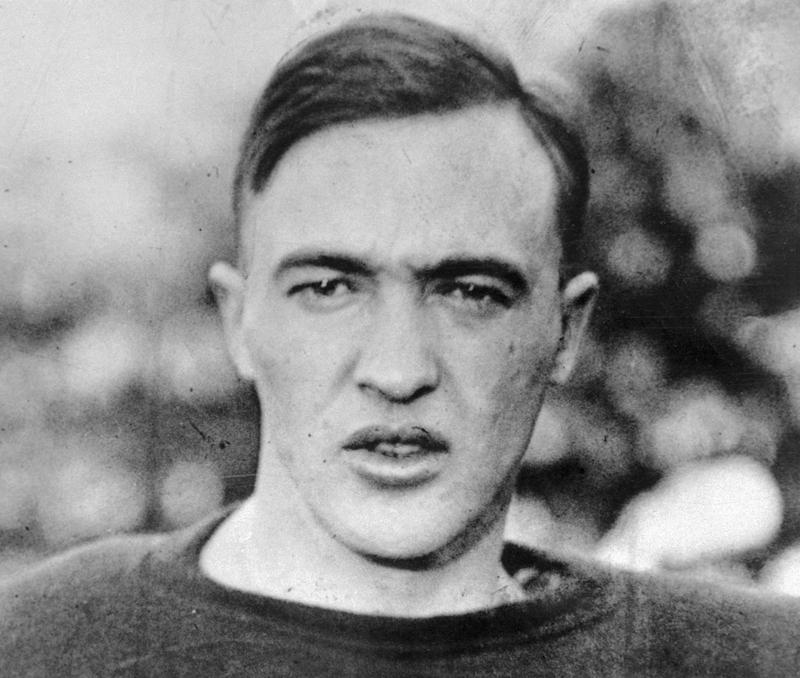The Story Behind “The Gipper” Speech, the Greatest Pep Talk in Sports
By | December 26, 2018

“Win One For the Gipper”. If you’re a fan of college football, you know that this was the one impassionate plea that rallied the Fighting Irish of the University of Notre Dame to an improbable victory over the undefeated Army in 1928. But who was the Gipper and what was his story?

George Gipp Was a Natural Athlete
Hailing from Michigan’s Keweenaw Peninsula way up at the top of the Upper Peninsula, George Gipp was born in 1895. A natural athlete, Gipp enrolled in the University of Notre Dame intent on playing baseball. His size, speed, and strength caught the attention of Knute Rockne, the head coach of Notre Dame’s football team. Without ever playing organized football, Gipp was added to the football team.

Gipp Played Quarterback and Punter
Gipp demonstrated an innate understanding of the game of football, as well as tremendous leadership qualities. Rockne used him in several different positions, including quarterback, halfback, and punter. Throughout his college football career, Gipp held a school record for rushing yards…2,341 rushing yards…and the record stood uncontested for more than fifty years. Gipp is still the record holder for the average yards per rush, average yards per game of total defense, and career average yards per play of total offense. George Gipp was the very first play for Notre Dame to be named a Walter Camp All-American.

Gipp Was Healthy Throughout His Senior Year
In 1920, George Gipp was in his senior year at Notre Dame and, athletically, he was in his prime. He was 25 years old, strong, and active. He led the Fighting Irish to victory over Northwestern on November 20 and, afterwards, he stayed on the field to give a punting lesson to youngsters. The Northwestern game would be the last football game the mighty Gipp would play.

Gipp Spent A Freezing Night Sleeping Outside
According to the legend of the Gipp, the robust football player fell ill after sleeping outside in the chilly November. He had stayed out too late, the story goes, and missed curfew. When he got back to his dorm room, the doors were locked. He tried to gain access to Washington Hall on the Notre Dame campus, knowing that the door to the theatre was often left unlocked, but this time, it was locked. He had no choice but to spend the night sleeping outside in the cold.

Gipp Contracted Strep and Pneumonia
When George Gipp came down with strep throat and pneumonia, folks chalked it up to sleeping in the cold. Back then, it was commonly believed that one could catch a cold by being cold and that breathing frigid air caused illness. Little was known about bacteria and viruses and their role in the spread of disease. While people blamed Gipp’s sickness on the cold night air, it was more likely that he picked up a virus from one of the kids he worked with when he gave punting lessons after the Northwestern game.

Gipp Got Sicker and Sicker
In 1920, antibiotics were not yet available. Gipp languished as the strep and pneumonia ravaged his once-healthy athlete. As he lay in his hospital bed, his coach, Knute Rockne, paid him a visit. During the visit, Gipp knew he was dying, so the story goes. He said, “I’ve got to go, Rock. It’s all right. I’m not afraid.” He continued by adding that he knows that, sometime in the future, the Fighting Irish football team will find themselves in a challenging spot when “things are wrong and the breaks are beating the boys.” At that time, Gipp told Rockne, “ask them to go in there with all they’ve got and win just one for the Gipper.”

Rockne Pocketed Gipp’s Wish For Eight Years
Gipp passed away on December 14, 1920, and the loss of such an inspiring athlete shook the Notre Dame community. Rockne took Gipp’s words to heart and pocketed them, waiting for the best time to use them. That time came eight years later in 1928 when The Fighting Irish were in the midst of one of their worse football seasons and set to face the undefeated Army.

An Upset Win
When the Fighting Irish took the field after half time, they were determined to fight for victory over Army. That win was cemented when Jack Chevigny scored the winning touchdown to upset the undefeated Army for a final score of 12-6.

The Speech Was Memorialized in Film
The incredible win, Rockne’s rallying speech, and the story of George Gipp were all included in the 1940 film, Knute Rockne, All American. Playing the role of George Gipp was actor Ronald Reagan, who went on to use the “win one for the Gipper” line decades later when he campaigned for President of the United States.

